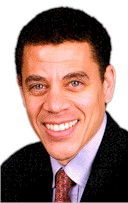
Powell
Commissioner Powell Accuses Chairman Kennard of Politicizing
FCC
(April 19, 2000) FCC Commissioner Michael Powell accused FCC Chairman William Kennard of politicizing the Federal Communications Commission, and placing its independence and integrity at risk. The accusation concerns a political trip to California and New Mexico on Monday, April 17 by Bill Clinton, William Kennard, FCC Commissioner Gloria Tristani, and others.
| Related Documents |
| Statement by Powell, 4/18/00. |
| Reply by Kennard, 4/18/00. |
"I am sincerely troubled by what appears to be the unabashed politicization of Commission business," said Powell in a statement. He added that he "strongly object[s] to the Chairman carefully orchestrating Commission business to play on the political stage in support of White House activities."
 |
|
| Michael Powell |
"Such action puts at risk the independence and integrity of the FCC and its career staff by purposely joining our authority and agenda with that of the Administration. We are now credibly subject to the criticism that our decisions are not the product of an independent evaluation of what is in the public interest, but are instead a bow to what is in the political interest," said Powell.
Clinton traveled to East Palo Alto, California, and to the Navaho Nation in New Mexico, on Monday, April 17, to talk about connecting schools, libraries, low income people, and Native Americans to the Internet.
Unlike the line federal departments, the Federal Communications Commission is structured as an independent commission made up of five members representing both political parties. It is independent of the President. It was created to provide objective technical expertise and nonpartisan administration of telecommunications statutes. The political entity which represents the administration on telecommunications matters is the National Telecommunications and Information Administration (NTIA).
Powell's accusation comes less than a week after Rep. Billy Tauzin (R-LA), the Chairman of the House Telecommunications Subcommittee, called for a criminal investigation by the Department of Justice into illegal lobbying activities by the FCC.
| Related Story: House Passes Bill to Restrain FCC on Low Power FM. |
Rep. Tauzin alleged on the House floor on April 13 that FCC personnel were lobbying Members of Congress against voting for HR 3439, the Radio Broadcasting Preservation Act. 18 U.S.C. § 1913 prohibits federal departments and commissions from lobbying the Congress. However, despite FCC opposition, the bill passed overwhelmingly by a vote of 274 to 110.
Bill Clinton and a large entourage traveled to East Palo Alto on Monday to discuss providing Internet access to schools and libraries and low income people. They they traveled to the Navaho Nation in New Mexico to promote a proposal being considered by the FCC to provide low cost telephone service on Indian reservations.
Chairman Kennard's office issued a press release regarding the proposal which stated that "William E. Kennard, chairman of the Federal Communications Commission (FCC), and Commissioner Gloria Tristani joined President Clinton today in announcing a plan ..."
| Related Document, Further Notice of Proposed Rulemaking, In the Matter of Federal-State Joint Board on Universal Service Promoting Deployment and Subscribership in Unserved and Underserved Areas, Including Tribal and Insular Areas, CC Docket No. 96-45, adopted August 5, 1999. |
Commission Powell retorted: "Contrary to the impression engineered that this initiative is a new and dramatic proposal by the Administration, this initiative is in fact a Commission item that was formally initiated in August of last year."
Clinton also claimed credit for himself and Al Gore for the e-rate, although this too is an FCC program.
Clinton also used the trip to promote Al Gore's presidential campaign. He was asked at a meeting at the Lake Valley School on the Navaho Nation, "how is this going to affect the education of Indians here in the United States?"
Clinton concluded his answer with the statement, "And of course, if Vice President Gore is the next President, I think he will continue that policy."
 |
|
| William Kennard |
William Kennard quickly issued a statement rebutting Michael Powell's accusation. He said that, "As all of my statements have made clear, and as the President himself said in his remarks and his official releases, the proposal to increase telephone access comes from the FCC. President Clinton endorsed the proposal as part of his official duties as President. He is not running for office, and these were not campaign appearances."
Chairman William Kennard is a Washington telecommunications lawyer, and a Democrat. Commissioner Gloria Tristani, who is also a Democrat, is frequently mentioned as a possible Democratic candidate for Congress from New Mexico. Commissioner Michael Powell is a Republican. He was a military officer who became a lawyer after a career ending injury.